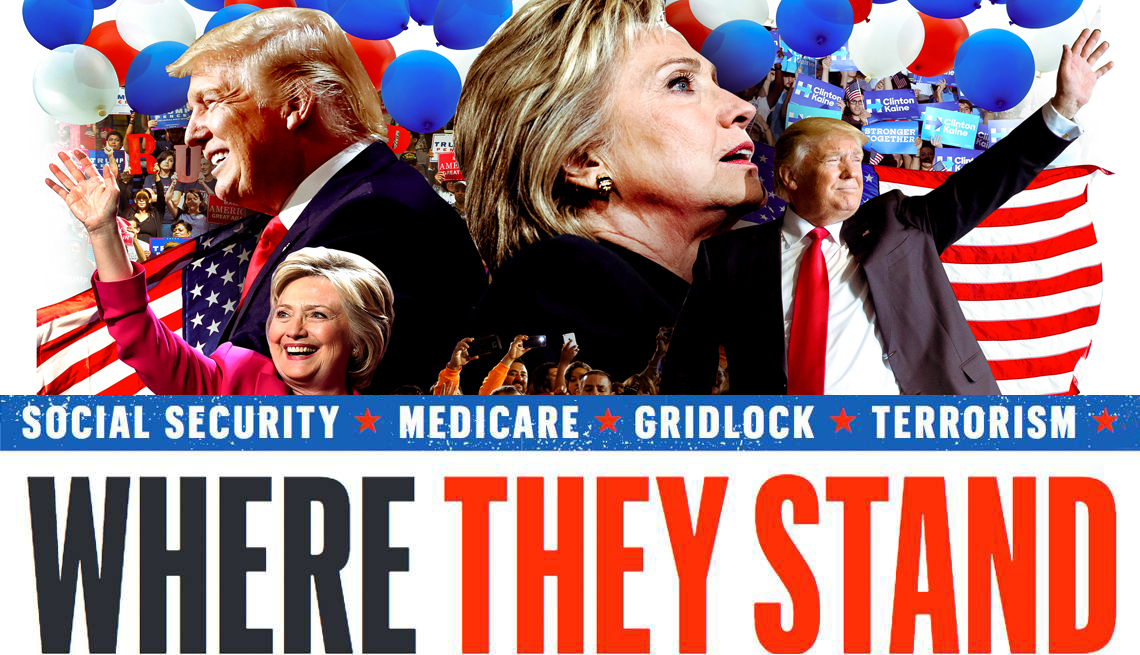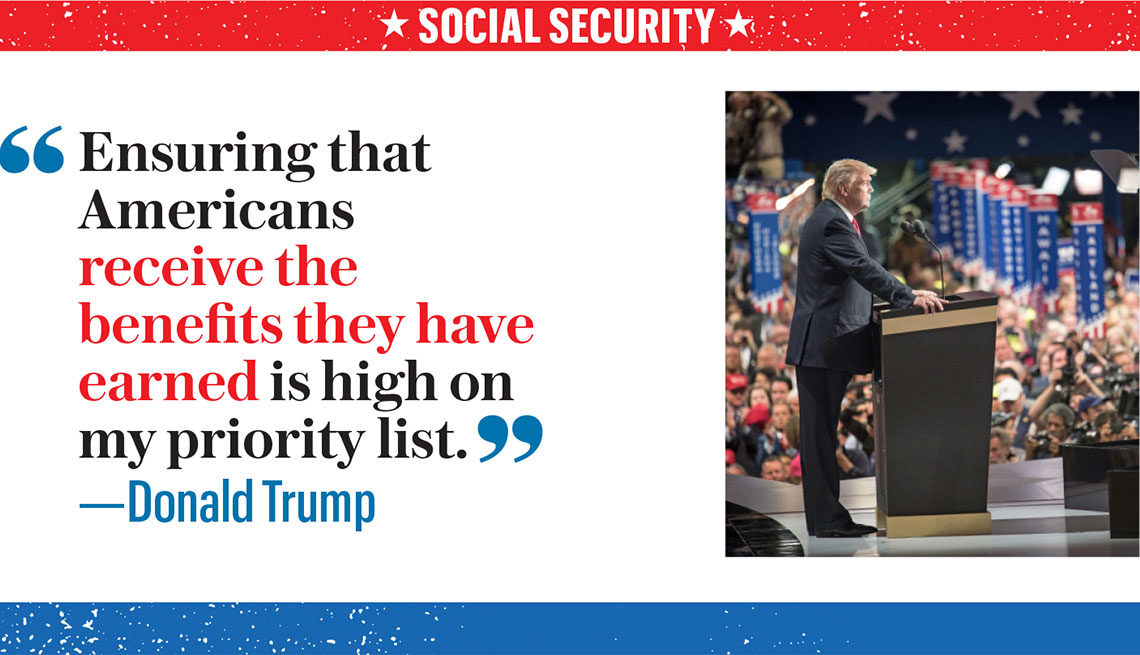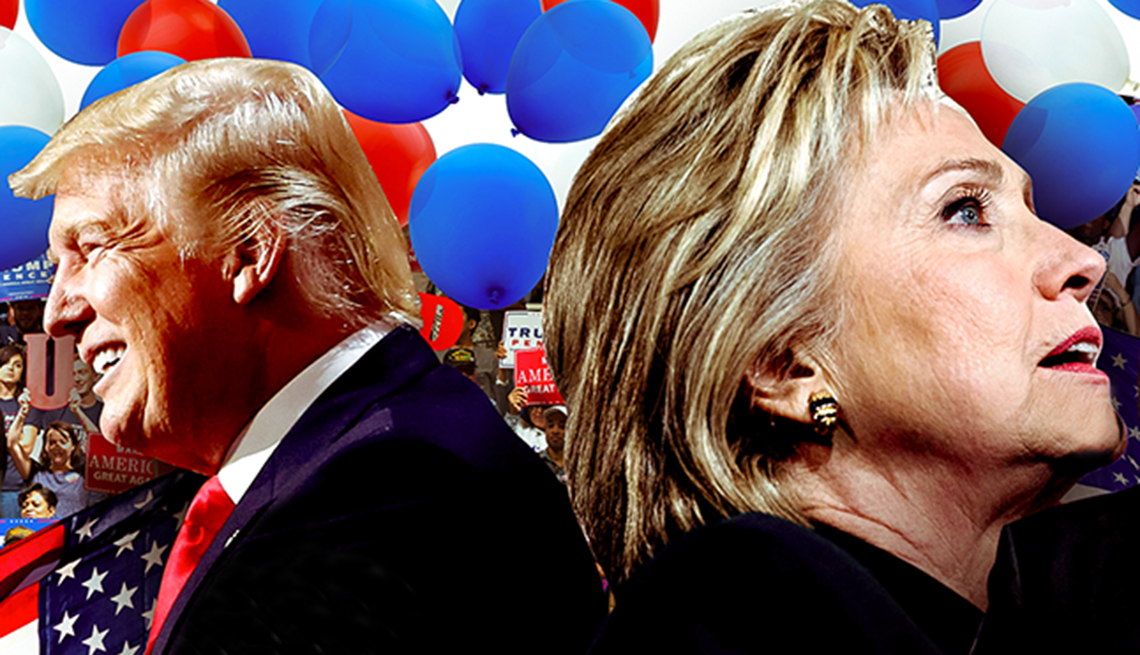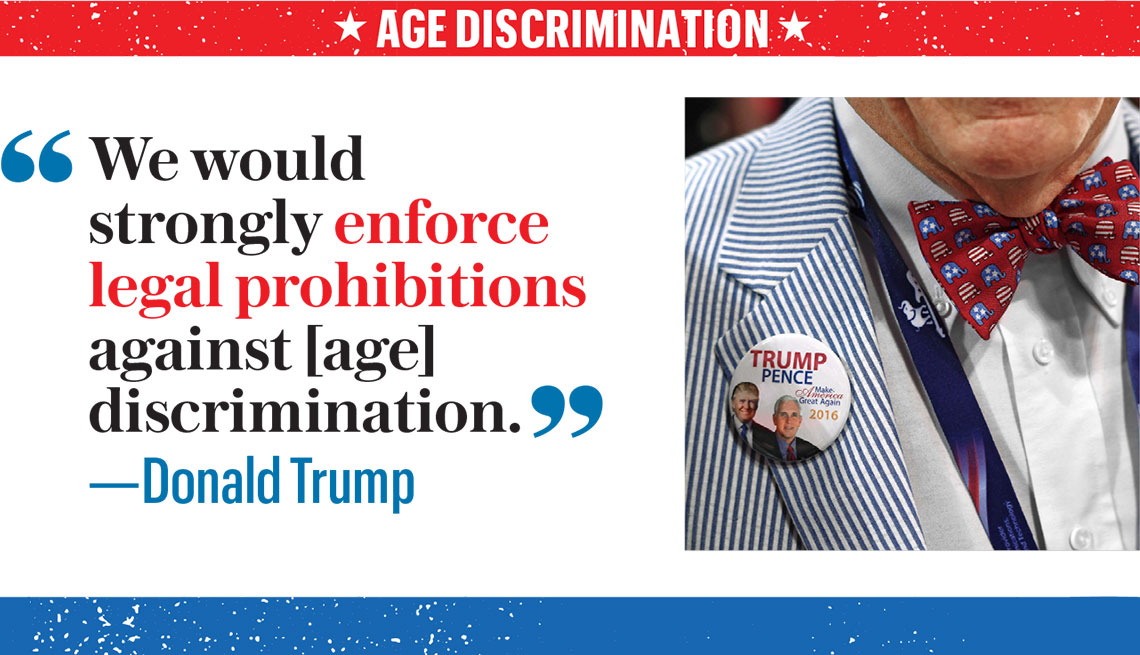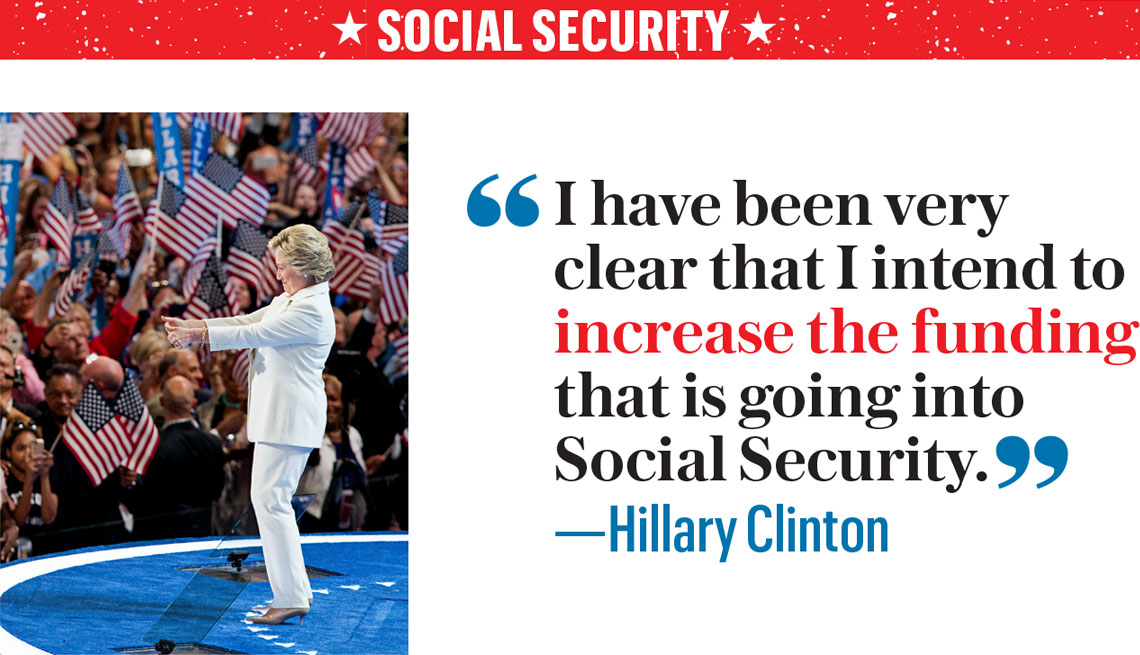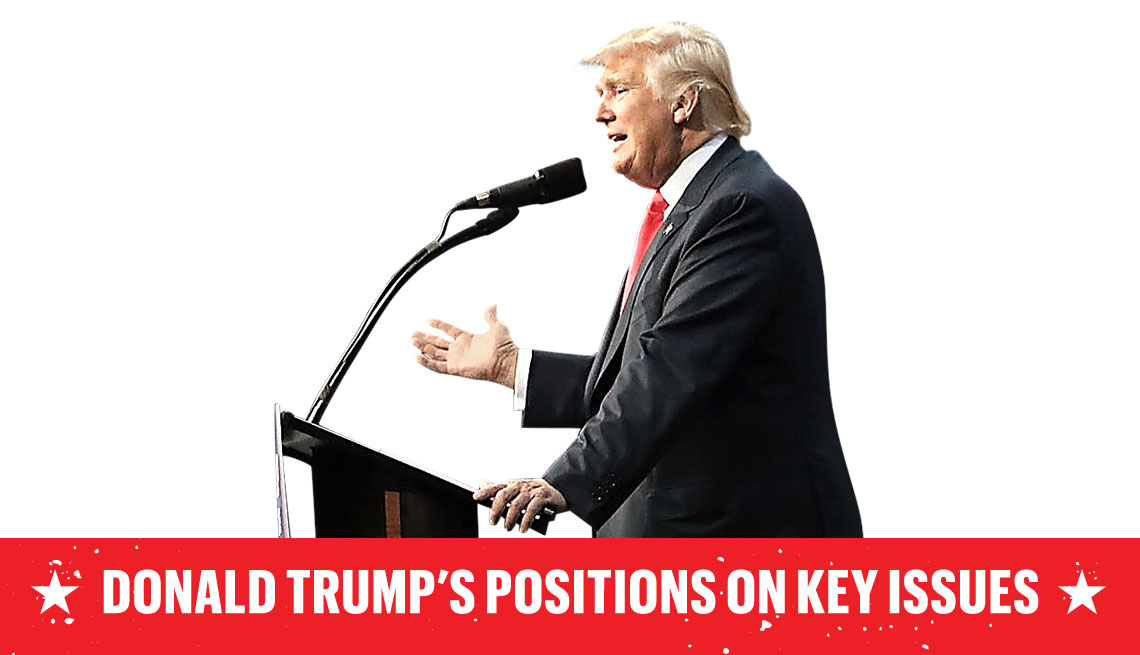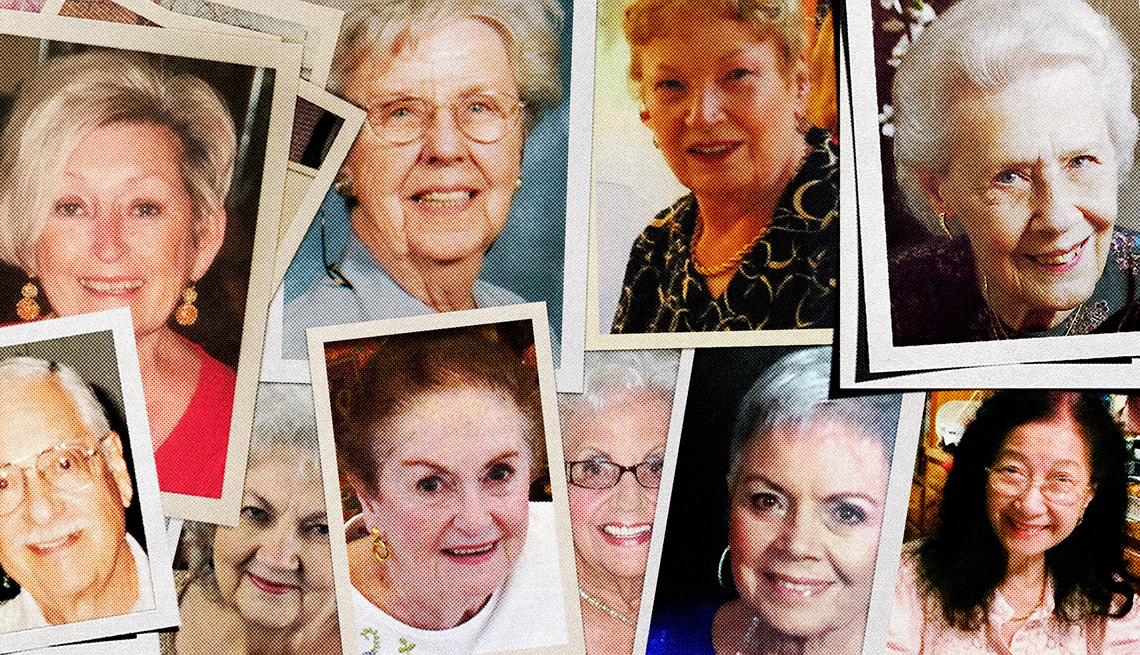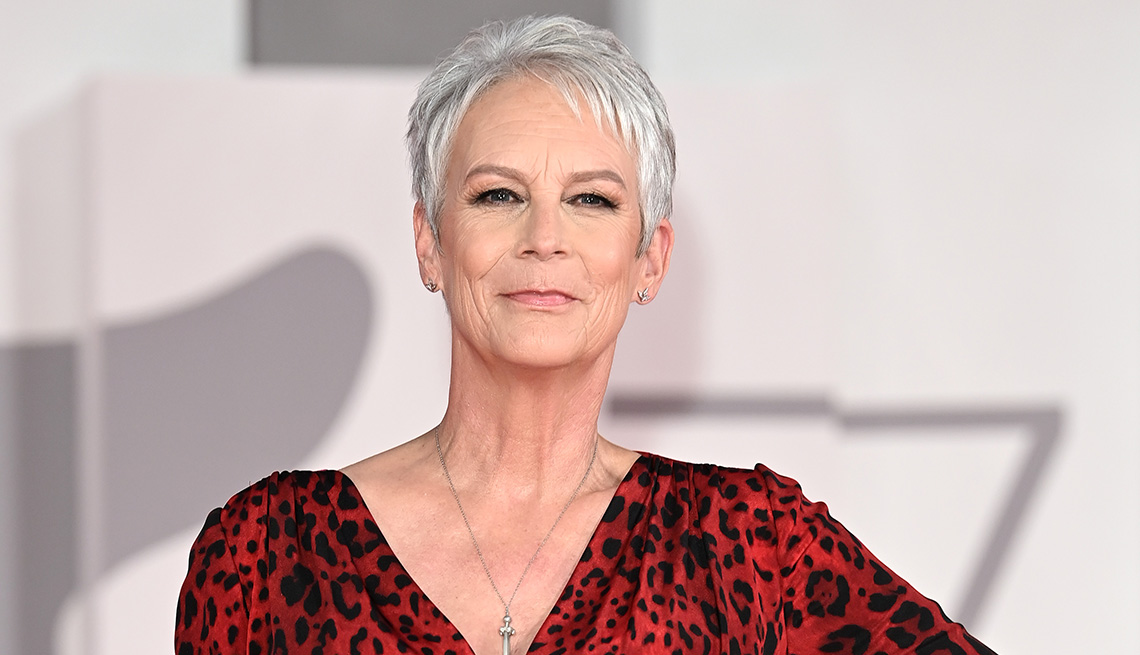In order to help our readers make informed decisions in the upcoming election, we have included Donald Trump’s positions on some of the issues critical to voters over 50 from a previous AARP Bulletin article, from his official website and from two major policy speeches he gave in late summer.
TRUMP ON SOCIAL SECURITY
Written response in June to AARP
The key to preserving Social Security and other programs that benefit AARP members is to have an economy that is robust and growing. For too long Americans have had a great deal of uncertainty in their lives, and the reforms I will bring to D.C. will remove that uncertainty and will restore confidence in the American economy.
First, I will work with Congress to pass and implement a comprehensive tax-reform plan. Aside from dramatically streamlining personal income tax by removing carve-outs for special interests and reducing the number of brackets, we will also seek to eliminate the alternative minimum tax and the death tax. The centerpiece of our tax-reform efforts will be on the corporate side, where we will lower the rate to 15 percent, allow repatriation of offshore capital at 10 percent, stop taxing returned earnings from overseas that have already been taxed, and allow 100 percent expensing for businesses. These reforms will apply to all business enterprises, not just the largest corporate giants.
Tax reform, however, will not be enough. We will need to renegotiate trade deals and impose budget discipline so that we can stop this reckless behavior that continues to increase our debt. We will move to repeal Dodd-Frank and the Affordable Care Act so as to bring market forces to bear that will increase competition and lower costs to consumers.
We will finally mount a campaign to attack fraud, waste and abuse in the government and will examine reducing the size of the federal workforce. We are spending too much money on enterprises that are of little added value in the lives of Americans.
I will work with Congress to ensure we have a pro-growth agenda in place. If we are able to sustain growth rates in GDP that we had as a result of the Kennedy and Reagan tax reforms, we will be able to secure Social Security for the future. As our demography changes, a prudent administration would begin to examine what changes might be necessary for future generations. Our goal is to keep the promises made to Americans through our Social Security program.
TRUMP ON CAREGIVING
From Donald Trump’s official website
The Trump plan will provide Americans the option of opening dependent care savings accounts (DCSAs) so that they can plan for future expenses relating to child and elder care. Annual contributions to a dependent care savings account and earnings on the account will not be subject to tax.
Total contributions could not exceed $2,000 per year from all sources, but balances in a DCSA will roll over from year to year so that substantial amounts could be accumulated over a period of years.
When established for an elderly dependent, the funds can be used for adult day care, in-home or long-term care services. The ability to set aside funds tax-free would be particularly helpful to women, low-income workers and minorities, who are typically primary-care providers that reduce paid time worked in order to provide care.
The ability to set aside funds for elder care is critically important because taking time off from working to care for elderly family members reduces a woman’s financial readiness for retirement, and can increase a woman’s risk of living in poverty in old age.
The Trump plan would also allow an above-the-line deduction for elder care costs necessary to keep a family member working outside the home.
It would apply to costs like home care or adult day care costs for elderly dependents when those expenses are needed to keeping family members in the workforce. The deduction would be limited to $5,000 per year.
TRUMP ON HEALTH CARE COSTS
From Donald Trump’s official website
If we were to simply enforce the current immigration laws and restrict the unbridled granting of visas to this country, we could relieve health care cost pressures on state and local governments.
To reform health care in America, we need a president who has the leadership skills, will and courage to engage the American people and convince Congress to do what is best for the country.
Since March of 2010, the American people have had to suffer under the incredible economic burden of the Affordable Care Act—Obama-care. This legislation, passed by totally partisan votes in the House and Senate and signed into law by the most divisive and partisan president in American history, has tragically but predictably resulted in runaway costs, websites that don’t work, greater rationing of care, higher premiums, less competition and fewer choices. Obamacare has raised the economic uncertainty of every single person residing in this country. The damage done by the Democrats and President Obama, and abetted by the Supreme Court, will be difficult to repair unless the next president and a Republican Congress lead the effort to bring much-needed free market reforms to the health care industry.
On day one of the Trump administration, we will ask Congress to immediately deliver a full repeal of Obamacare. However, it is not enough to simply repeal this terrible legislation. We will work with Congress to make sure we have a series of reforms that follow free market principles and that will restore economic freedom and certainty to everyone in this country. By following free market principles and working together to create sound public policy, we will broaden health care access, make health care more affordable and improve the quality of the care available to all Americans.
TRUMP ON TERRORISM AND NATIONAL SECURITY
Speech in Youngstown, Ohio, on national security, Aug. 15
If I become president, the era of nation building will be ended. Our new approach, which must be shared by both parties in America [and] by our allies overseas, must be to halt the spread of radical Islam. All actions should be oriented around this goal, and any country which shares this goal will be our ally. We cannot always choose our friends, but we can never fail to recognize our enemies.
As president, I will call for an international conference focused on this goal. We will work side by side with our friends in the Middle East, including our greatest ally, Israel. We will partner with King Abdullah of Jordan and President Sisi of Egypt, and all others who recognize this ideology of death that must be extinguished.
I also believe that we could find common ground with Russia in the fight against ISIS. They, too, have much at stake in the outcome in Syria, and have had their own battles with Islamic terrorism.
My administration will aggressively pursue joint and coalition military operations to crush and destroy ISIS, international cooperation to cut off their funding, expanded intelligence sharing and cyberwarfare to disrupt and disable their propaganda and recruiting.
We cannot allow the internet to be used as a recruiting tool, and for other purposes, by our enemy. We must shut down their access to this form of communication, and we must do so immediately.
The fight will not be limited to ISIS. We will decimate al-Qaida, and we will seek to starve funding for Iran-backed Hamas and Hezbollah. We can use existing U.N. Security Council resolutions to apply new sanctions.
Military, cyber and financial warfare will all be essential in dismantling Islamic terrorism. But we must use ideological warfare as well. Just as we won the Cold War, in part, by exposing the evils of communism and the virtues of free markets, so too must we take on the ideology of radical Islam.
Our administration will be a friend to all moderate Muslim reformers in the Middle East, and will amplify their voices.
TRUMP ON TAX REFORM
Speech in Detroit on economic policy, Aug. 8
I am proposing an across-the-board income tax reduction, especially for middle-income Americans. This will lead to millions of new good-paying jobs.
The rich will pay their fair share, but no one will pay so much that it destroys jobs, or undermines our ability to compete.
As part of this reform, we will eliminate the carried interest deduction and other special-interest loopholes that have been so good for Wall Street investors, and people like me, but unfair to American workers. Tax simplification will be a major feature of the plan. Our tax code is so burdensome that we waste 9 billion hours a year in tax-code compliance.
My plan will reduce the number of brackets from 7 to 3, and streamline the process. We will work with House Republicans on this plan, using the same brackets they have proposed: 12, 25 and 33 percent. For many American workers, their tax rate will be zero.
While we will develop our own set of assumptions and policies, agreeing in some areas but not in others, we will be focused on the same shared goals and guided by the same shared principles: jobs, growth and opportunity.
These reforms will offer the biggest tax revolution since the Reagan tax reform, which unleashed years of continued economic growth and job creation.

